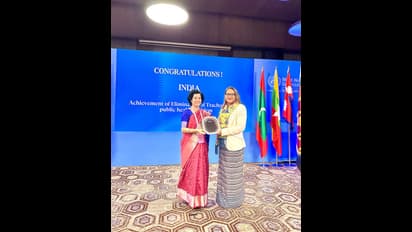India awarded by WHO for eliminating Trachoma: All you need to know about infectious eye-disease | Explained

Synopsis
In a resounding endorsement of India’s healthcare triumphs, the World Health Organization (WHO) has commended the Indian government for its monumental achievement in eliminating the serious bacterial infection known as trachoma.
In a resounding endorsement of India’s healthcare triumphs, the World Health Organization (WHO) has commended the Indian government for its monumental achievement in eliminating the serious bacterial infection known as trachoma. "India’s success is due to the strong leadership of its Government," remarked Saima Wazed, the Regional Director of WHO South-East Asia, highlighting the importance of robust governance in this public health milestone.
The elimination of trachoma is a pivotal part of the WHO’s 2021–2030 neglected tropical disease roadmap, a global initiative aiming to prevent, control, and ultimately eradicate 20 debilitating diseases and disease groups by 2030. India’s accomplishment is a significant stride toward these ambitious goals, cementing the nation’s position as a leader in global health efforts.
The Indian government had previously declared the country free from infectious trachoma, particularly in children. This announcement followed rigorous National Trachoma Prevalence Surveys and Trachoma Rapid Assessment Surveys conducted between 2014 and 2017, which revealed that the overall prevalence of active trachoma had plummeted to a mere 0.7 percent—a testament to India’s relentless pursuit of disease eradication.
The Ministry of Health proudly tweeted, "India receives a citation from @WHOSEARO at the ongoing 77th Regional Conference for eliminating Trachoma as a public health problem. The award was received by Smt. Aradhana Patnaik, AS & MD (NHM), Ministry of Health & Family Welfare. A significant milestone, this reaffirms the country’s commitment to eye health, disease prevention, and universal health coverage."
What is Trachoma? All you need to know
Trachoma, a highly contagious bacterial infection caused by Chlamydia trachomatis, is one of the world’s leading causes of blindness due to infectious disease. It disproportionately affects impoverished regions where sanitation and access to clean water are scarce. The bacteria spread through direct contact with the eyes or nasal secretions of infected individuals, and flies that come into contact with these secretions can also transmit the disease.
In its early stages, trachoma manifests as conjunctivitis or “pink eye,” but if left untreated, recurrent infections lead to scarring of the inner eyelid. This can cause trichiasis—a painful condition where the eyelashes turn inward and scrape against the cornea, leading to damage, excruciating discomfort, and eventually blindness.
Fortunately, trachoma is preventable and treatable. Early-stage infections can be managed with antibiotics such as azithromycin, while improved hygiene, better access to clean water, and sanitation are vital in preventing the disease’s spread.
India's achievement places it alongside Nepal, Myanmar, and Pakistan, who have also successfully eliminated trachoma in Southeast Asia. In addition to India's accolade, Bhutan was honored for reaching interim targets in the fight against cervical cancer; Timor-Leste for eradicating lymphatic filariasis; and Maldives and Sri Lanka for their impressive control of Hepatitis B in children. Six other nations were recognized for hitting Sustainable Development Goal (SDG) targets for reducing under-five mortality and stillbirth rates.
Stay updated with the Breaking News Today and Latest News from across India and around the world. Get real-time updates, in-depth analysis, and comprehensive coverage of India News, World News, Indian Defence News, Kerala News, and Karnataka News. From politics to current affairs, follow every major story as it unfolds. Get real-time updates from IMD on major cities weather forecasts, including Rain alerts, Cyclone warnings, and temperature trends. Download the Asianet News Official App from the Android Play Store and iPhone App Store for accurate and timely news updates anytime, anywhere.